How to Stop Teeth Clenching?
8th Mar 2020
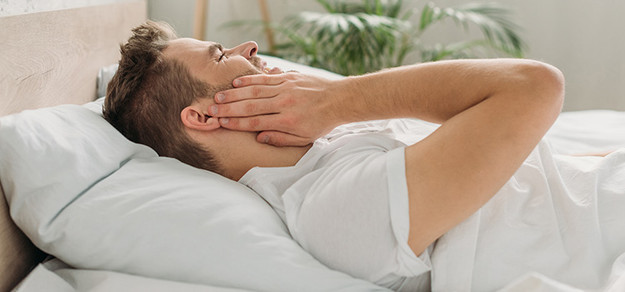
Another morning, another splitting headache. Or maybe you’re wrestling with persistent jaw soreness for what feels like the millionth day in a row. Sometimes you don’t even look forward to hitting the sack because you know you’ll be greeted with tooth soreness and pain before your alarm clock even goes off. If this sounds like you, there’s a good chance you suffer from teeth grinding, which is also known as bruxism. And it can do a real number on your oral health. It would be very helpful if you learn how to stop teeth clenching.
However, while up to 31% of the population may suffer from some form of teeth clenching, you don’t have to be one of them. From botox to mouth guards, there are several ways you can unburden yourself from the pain and discomfort of clenching your teeth during the day or night.
But first, let’s discuss what teeth grinding is, how it can affect your dental health, when it’s the right time to see a dentist, and ways you can prevent it.
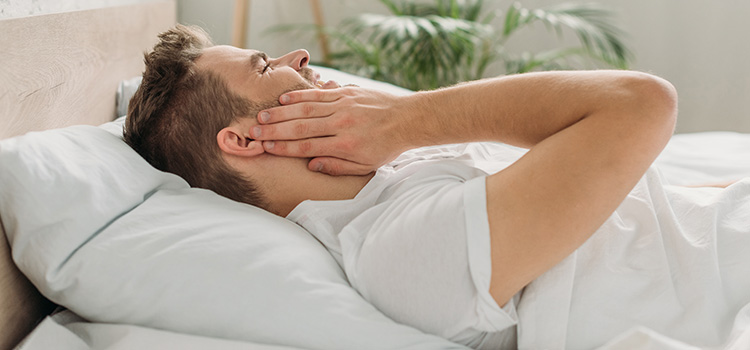
What Is Bruxism Exactly?
The term “la bruxomanie” was first introduced in 1907 and later morphed into “bruxism” to describe teeth grinding without a functional purpose. In a nutshell, bruxism is a medical condition where repetitive jaw muscle activity causes continual clenching and grinding of your teeth against each other.
There are two different ways to classify teeth grinding — awake and sleep bruxism. Awake bruxism is usually associated with anxiety and stress from work and family life. Sleep bruxism falls under the umbrella of sleep disorders. People who experience nighttime teeth clenching are also more likely to have other sleep-related movement issues, like sleep apnea or snoring.
Related Articles:
- Why Do My Teeth Hurt When I Wake Up?
- Homeopathic Remedies for Teeth Grinding
- Alcohol And Teeth Grinding
What Causes bruxism and Teeth Clenching?
There isn’t one clear-cut answer for what causes bruxism or teeth clenching and grinding. People who suffer from nervous tension, pain, or frustration can experience these issues more frequently, along with those who have aggressive or competitive tendencies. In some cases, an imbalance in brain neurotransmitters may be to blame.
It’s even possible to suffer from bruxism as a result of certain medications or antidepressants. Normal daily activities like enjoying your morning cup of coffee or evening glass of wine may be a factor too.
Bruxism sometimes runs in families, so if you suffer from it, there’s a good chance someone else in your family also has had issues with clenching or grinding.
While it might be frustrating that you can’t necessarily pin teeth grinding down to one cause, it doesn’t mean that you can’t find relief from jaw clenching and the discomfort it causes.
Related Article: Is Teeth Grinding Hereditary?

Effects of Teeth Clenching on Oral Health
Even though teeth clenching might not seem like a big deal, it can result in quite a bit of pain, discomfort, and issues for your oral health.
Bruxism can cause a laundry list of issues. According to the Mayo Clinic, it can cause your teeth to become chipped, flattened, fractured, or loose, and it can cause tooth sensitivity and damage to your cheeks from chewing on them all night. Teeth grinding can also be to blame for inflamed or receding gums.
And that’s just inside your mouth.
Teeth clenching can lead to jaw, neck, or facial pain and soreness, pain that feels like an earache (even if your ears are fine) and disorders with your temporomandibular joints (TMJs) causing a clicking sound whenever you open or close your mouth.
A quick note on teeth grinding and your TMJ: Sustained clenching puts a considerable amount of stress on the joint and can eventually lead to temporomandibular disorders (TMD). TMD can then cause even more extensive and painful symptoms. Pain in the facial muscles can spread behind the eyes and into the neck and shoulder muscles along with ringing in your ears, trouble chewing, or opening and closing your mouth.
When Is It Time to See a Dentist?
If you’re consistently experiencing sore jaw, pain in your jaw muscles, facial pain, headaches, and earache-like pain or notice damage and worn areas on your teeth, book an appointment with your dentist.
Your dentist can check for any obvious issues and take x-rays to determine the state of your dental health and give you medical advice.
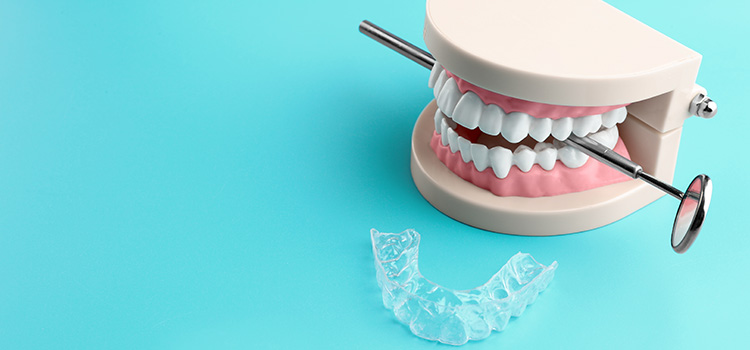
Treatment Options for Teeth Clenching
Though teeth grinding carries a host of issues, there are many different ways you can treat teeth grinding.
Mouthguards
Mouthguards and splints are popular options to ease nighttime teeth clenching. Wearing a night guard can even out the amount of pressure exerted on your teeth as well as protect them from making contact with each other in the first place.
A night guard can be invaluable in the fight against teeth grinding and helping keep your dental health on point. The damage to your teeth from continual grinding can be expensive to repair. Dr. Ivo Sokol, DDS, emphasizes that “investing in a night guard can save patients more money and save the health of their teeth.”
Your best bet is to pick up a custom mouthguard. It might be tempting to use a sports mouth guard, but the materials used aren’t the same and they protect your teeth in different ways. Plus, they aren’t generally comfortable enough to use all night.
Related Articles:
- Mouth Guard for Teeth Grinding
- Sport Mouth Guard vs. Dental Night Guard
- Do I Really Need a Night Guard?
Botox Injections
Believe it or not, Botox can help with teeth clenching. Even though it usually occupies a space in the anti-aging realm, it’s showing promise in treating sleep bruxism.
A single injection can dramatically reduce pain associated with clenching and has minimal adverse effects. For fellow science nerds out there, botox inhibits acetylcholine from being released by nerve endings in the neuromuscular junction, causing the glands and muscles to become inactive. And you start looking forward to a better night’s sleep with more pain-free mornings.
It’s worth mentioning that not all cases of bruxism can be treated in a single session. Sometimes, several are needed before you can see results.
Related Article: Botox for Bruxism Treatment
Pharmacological Therapy
There is some evidence to support that muscle relaxants and other pharmaceuticals used to treat anxiety can have a temporary effect on jaw muscle activity. Further studies are needed to determine long term efficacy and safety, so definitely discuss this option with your healthcare provider to see if it’s the right fit for you.
Biofeedback
Another option that may be the right choice for you is exploring biofeedback. Biofeedback involves an electronic instrument that measures muscle activity in your mouth and jaw. When too much activity registers on the device, it sends you a signal so you can start to replace those habits with new ones.
Biofeedback is especially helpful for daytime teeth grinding. Still, one study showed promise in managing sleep bruxism. At the 6 and 12-week marks, there was a significant decline in both the number of grinding episodes and their duration.
Related Article: Biofeedback for Bruxism
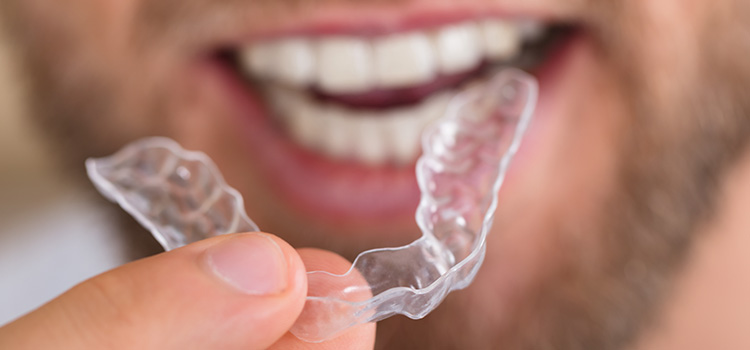
How to Prevent and Alleviate the Symptoms of Teeth Clenching
Since stress and anxiety can play a role in teeth clenching, getting a handle on both of those is a great place to start prevention.
Exercise, in particular, gives you a high return on investment. Almost any form of exercise can help you manage stress, so no worries about having to jump into a strenuous fitness routine. Something as simple as going for a walk around the neighborhood or heading to a yoga class might do the trick.
Creating a relaxing bedtime routine can be helpful too. Try to minimize screen time before bed and take the opportunity to read a favorite book or journal to clear your mind before settling into bed.
Lastly, give some thought to trigger point massage and jaw exercises. Find a provider in your local area who has a thorough understanding of TMJ musculature. With proper massage techniques, they bring relief to tight muscles and reduce inflammation from overuse.
It can no doubt be painful and frustrating to endure the discomfort of nightly teeth clenching, but there are several avenues you can explore to help you stop teeth grinding and get back to a restful night’s sleep.
Related Articles:
How to Stop Teeth Clenching and Get a Restful Sleep
A good night’s sleep sets the tone for the day. But with bruxism, your sleep often comes with jaw pain and even tooth damage. Now that you understand the causes and treatment and preventive options for teeth grinding, you can get to work and return to restful sleep
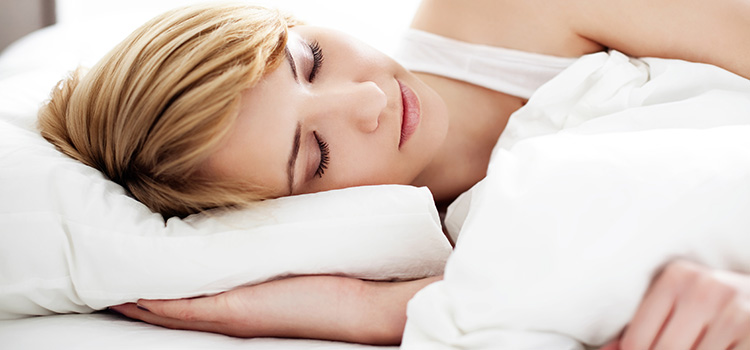
Sources:
- mayoclinic.org
- Health.clevelandclinic.org
- nhs.uk
- Ncbi.nlm.nih.gov
- hopkinsmedicine.org

- Most Popular
- Hard Outside, Soft Inside
- 2MM Thick
- Moderate / Heavy

- Most Durable
- Hard Materials
- 1.5MM Thick
- Heavy / Severe

- For Day Time Use
- Thin, Barely Visible
- 1MM Thick
- Light / Moderate

- For Clenching
- Flexible & Soft
- 1.5MM Thick
- Light / Moderate

